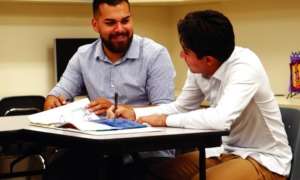A report released by the U.S. Chamber of Commerce at a program on the need for innovation in higher education examines several new ventures aimed at expanding and personalizing distance learning, but most of the narrative criticizes the efforts by Congress and the Obama administration to ensure that for-profit colleges are providing the kind of education their students are paying for.
Entitled “Transforming Higher Education through Greater Innovation and Smarter Regulation,” the report was written by consultant T. Vance McMahon, a George W. Bush adviser since his Texas governor days, and Mario Loyola, a former analyst for the U.S. Senate Republican Policy Committee. Its prime thesis is that public and nonprofit traditional higher education forms are dying methods of teaching – predicting a dramatic drop in their enrollments over the next decade – and that distance or online education will quickly replace them.
While the 32-page report extols the virtues and cost-saving features of online teaching, it says little about the effectiveness of the method in other than career education. It accuses federal and state regulations, along with accreditation requirements, of being major obstacles to the rapid expansion in the use of online instruction and posits that market forces ultimately will trim the huge profits now being earning by for-profit colleges, about 17 percent, to the level of other businesses, at about 7 percent.
For all things online, the two have nothing but praise; for traditional methods, they exude little other than contempt.
“Because the for-profit industry absorbs a disproportionate amount of Title IV funds, leaves some students with high debt burdens and default rates, and shows consistent profit margins in excess of the national average, the industry faces significant opposition,” the authors said. “This has led to expanded regulation of the for-profit industry and a much heavier oversight role by state and federal officials.”
The report then blasts each of the so-called “Program Integrity Regulations” being imposed by the U.S. Department of Education, including requiring distance learning programs to be authorized by individual states in which they operate, using repayment rates and alumni salaries to determine whether students are being prepared for gainful employment and defining what constitutes a “credit hour,” which in turn determines federal reimbursement rates for Pell grants and federal financial aid.
The authors seem to argue for no regulations, that market forces should be allowed to determine the rules under which for-profits operate.
“While the government has a role in setting standards to provide consumer protection and ensure accountability for outcomes, many of the concerns fueling calls for greater regulation are ones the market can – and should – take care of on its own,” the report states.
However, the report contains profiles of commercial ventures that are helping to integrate online and distance learning into more traditional setting, often personalizing curricula for individual students, providing online videos that can act as tutoring aids and the creation of the online Western Governors University.
WGU is one of the more innovative efforts. It’s a cooperative venture of 19 state governors that has created a completely online university that now enrolls 20,000 students in all 50 states and gives credit for what students have learned, whether in the classroom or on their jobs.






























